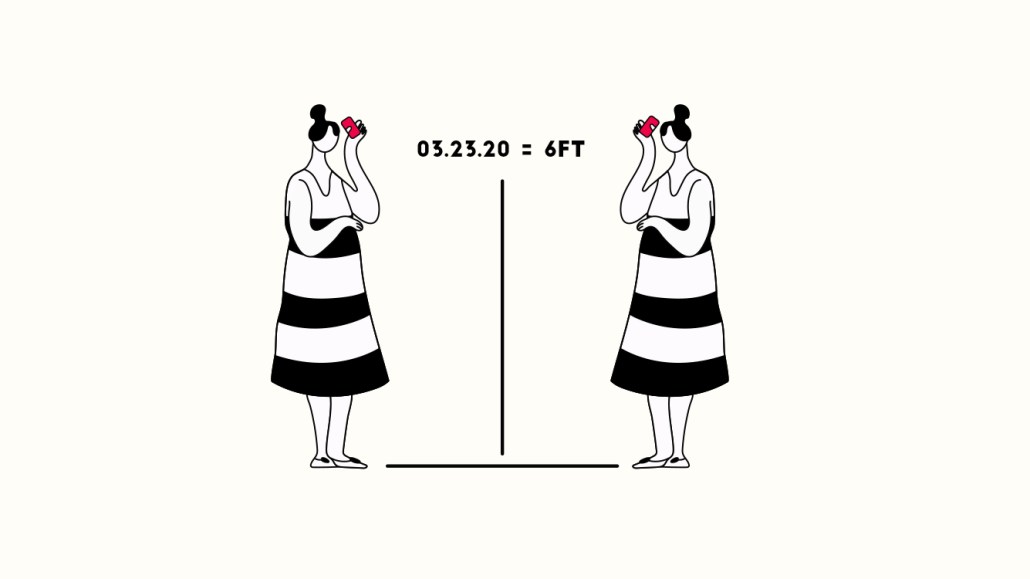Secure your place at the Digiday Media Buying Summit in Nashville, March 2-4
‘A lot of brands have lost confidence’: The Telegraph is tracking emotional response to coronavirus-related ads

The Telegraph has adapted what it measures in brand uplift studies, from driving purchase intent to driving an emotional response with readers. Proving that ads work, in a way that’s appropriate today, betters its chances of more dollars flowing in. Currently, The Telegraph is running dozens of campaigns where it is tracking emotion or sentiment.
Encouraging people to buy products during a humanitarian crisis seems a little uncouth. Brands had to adapt messages, defer campaigns or risk ridicule for seeming tone-deaf. Despite history showing that those who advertise during a crisis fare better than those that go dark, the majority of advertisers have frozen. Adapting the message often means adapting the objectives and measurement too.
“Our initial thought was, what is the impact going to be on a user’s behavior or a user’s attitude towards the brand?” said Anthony Crocker, head of campaign innovation. “A lot of brands have lost confidence because they aren’t sure what the correct kind of context is for them. We want to give brands more confidence to understand the emotional impact by tracking it.”
For the Flower Council of Holland, the publisher is tracking how readers respond emotionally to its ads which are running within its good-news editorial initiative, “You are not alone.” Surveys are retargeted tracking whether the ads make people feel more comforted, reassured or informed. The Telegraph, like others, is pitching advertisers bundles of its own good-news content, a guaranteed brand-safe environment to mitigate the pummeling publishers are getting from keyword block lists in the open marketplace. Because the campaign is still running, the publisher couldn’t share results.
News publishers are harder hit by advertisers pausing and canceling campaigns than non-news publishers: 88% of news publisher respondents said ad buyers asked to cancel campaigns, while 86% said advertisers asked to pause ads, according to the Interactive Advertising Bureau, (non-news publishers answered 70% and 79% respectively). A number of accommodating tactics are in play to keep money flowing, like price reductions, ad effectiveness guarantees, deferring when campaigns run and new content bundles.
An ongoing battle for many publishers is to prove the effectiveness of their ads in context beyond basic metrics like clicks. Proving that ads are effective is even more important now, as long as the objective fits the climate. The Telegraph has been working for the past year to prove that its ads move the dial on brand uplift metrics like awareness and purchase intent. The longer-term goal is to offer advertisers guarantees based on brand metrics, as it already does for branded content ads, encouraging more dollars to flow to the publisher.
“We’re seeing really strong evidence that actually for brands that are delivering something relevant now, a brand study is likely to deliver really really good results,” said Crocker. “The pivoting away from purchasing intent has been crucial to keeping it relevant.”
The Telegraph ran another campaign recently — planned before lockdown started in earnest — for a communication technology brand that, unsurprisingly, became a more relevant brand as living with lockdown progressed. Purchase intent increased 5.5 times, brand consideration increased fourfold. The benchmarks were based on results from 145 previous communication technology brand campaigns, said Crocker.
Campaigns need to cost north of £30,000 ($37,000) for The Telegraph to include brand studies. Most advertisers are interested, said Crocker, but they’ve grown from a nice-to-have addition to more of a priority over the year.
The Telegraph is working with Brand Metrics for its brand studies. The Brand Metrics tool tracks the exposure level to a campaign to understand how much of an impact it has had. If one reader is exposed to a campaign four times and another is exposed just twice, it measures the difference between the responses to work out the starting point if neither reader were exposed to the campaigns. From this, it calculates the lift.
“Brands are looking at ways they can help consumers through the lens of brand purpose. Research and insight help marketers understand how they can play a meaningful role,” said Lawrence Dodds, client director at Universal McCann, the same agency acting for the Flower Council of Holland.
While research grows in importance as advertisers and publishers get a handle on a new reality, there’s some indication a sharpened sensitivity to campaign tone could sustain beyond the lockdown period, said Crocker.
“There’s been a much bigger increase in people really wanting to make sure they understand how a campaign has landed emotionally,” said Crocker. “It feels like it’s gone up the priority list.”
More in Media

From feeds to streets: How mega influencer Haley Baylee is diversifying beyond platform algorithms
Kalil is partnering with LinkNYC to take her social media content into the real world and the streets of NYC.

‘A brand trip’: How the creator economy showed up at this year’s Super Bowl
Super Bowl 2026 had more on-the-ground brand activations and creator participation than ever, showcasing how it’s become a massive IRL moment for the creator economy.

Media Briefing: Turning scraped content into paid assets — Amazon and Microsoft build AI marketplaces
Amazon plans an AI content marketplace to join Microsoft’s efforts and pay publishers — but it relies on AI com stop scraping for free.





